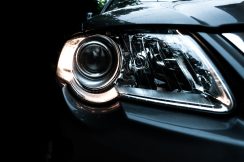For many drivers, getting into their car to notice a fast flashing turning signal can cause them to ask, “why is my blinker blinking fast?”. Turn signal lights typically emit 60 to 120 blinks per minute so that other drivers can promptly recognize and respond to the turn signals of vehicles on the road. What happens when a vehicle’s blinker blinks too fast? Here are some answers about what may be behind this issue, alongside solutions for troubleshooting it.
Why Is My Blinker Blinking Fast?
The turn signal circuit is uncomplicated, especially with older cars. The voltage from the battery passes through a fuse and then to a turn signal relay. A turn signal relay is also known as a flasher.
The turn signal switch then directs the voltage to one of the two circuits’ two turn signal lights. As the driver activates the turn signal switch, the voltage completes one of the two circuits, triggering the bulbs connected to that circuit to blink.
In the case of newer vehicles, flicking the turn signal switch signals a computer-based control module to blink in the selected direction.
The current, voltage, and resistance of the circuit must all be within the turn signal relay’s requirements for the lights to flash according to their programmed interval. Any adjustments can change a vehicle’s blinker speed. Here are a few reasons behind a vehicle’s turn signal lights blinking too rapidly.
A Bad Bulb
A faulty bulb is the most frequent cause of a fast-blinking signal. Defective, damaged, or burnt bulbs alter the resistance of the circuit, changing its flow and causing the turn signal to flash more quickly.
The turn signal relay is engineered to flash at the correct interval when both bulbs on one side of a car are in functional condition. Turn signal bulbs are also connected via parallel wiring. This configuration causes the resistance to change if one bulb operates at a higher or lower level than the others.
A Bad Turn Signal Relay
The turn signals may operate more quickly when the turn signal relay malfunctions. Rusted pins are an especially surefire sign that water has seeped into the relay.
A vehicle’s hazard lights may behave abnormally if the relay fails. The hazard lights or turn signals may not even switch off.
A Bad Turn Signal Fuse
A blown turn signal fuse is yet another potential cause of fast-blinking bulbs. The turn signals of most cars won’t function when the fuse blows, and replacement is typically necessary.
Bad Wiring
When it comes to automotive lighting, wiring is a significant problem. An insufficient voltage can arise from faulty wiring or an inadequate battery charge. The turn signal may thus blink rapidly from a lack of voltage from the power source.
Water damage, extreme heat, and other environmental factors can cause turn signals to become defective. Turn signal wires may also become rusted and worn out, causing their ground connection to weaken.
Other Electrical Issues
Electrical issues such as dim interior lighting or flickering dashboard lights may be present alongside a turn signal light that blinks too fast. Such concurrent electrical problems may also signal a battery or alternator needing repair or replacement.
When corrosion develops inside the socket where the bulb is installed, electricity may not be able to pass through the bulb. Using a screwdriver to scrape the bulb socket contacts free of residue may resolve the issue.
How Do I Fix a Malfunctioning Blinker?
Here are the steps to follow when a vehicle’s blinker has gone awry:
Check the Bulbs
It is crucial to check all the lighting to determine where the issue may be concentrated. Note each malfunctioning bulb, then note the condition of all adjacent lighting.
Test each signal direction, including those on the vehicle’s fenders, to determine whether any bulbs are noticeably out. If none appear to have failed, look for damaged filaments or dark, cloudy glass stained with residue.
If only one bulb seems faulty, replacing it may resolve the issue. However, numerous malfunctioning lights may signal that more electrical problems are at play.
Replace Any Defective Bulbs
The blinking speed can be affected by aftermarket parts not designed for the vehicle in question, so be sure to swap out any defective or mismatched bulbs with ones that meet the required specifications. Avoid aftermarket parts that add more lights or don’t cooperate with the turn signal relay. LEDs are not a suitable replacement for halogen bulbs.
Replace any defective bulbs, then check each signal for functionality.
Check the Wiring
Check whether the battery produces enough power, especially if the issue is not isolated to a single bulb. The battery may need to be charged or replaced if it cannot provide the lights with the proper level of electricity.
Look closely for any indications of corrosion, wear, burn damage to the wires, or a faulty connection. A loose wire, for example, may function intermittently. Check each cable with a multimeter or a test light to locate the root cause of the issue.
Check the Turn Signal Fuse
The turn signal fuse is usually found under the hood next to the turn signal relay. Look for signs of a break in the fuse’s internal wiring to determine whether it is blown, and replace it with a new one of the same capacity if the interior wire appears damaged. A turn signal fuse is easy and cheap to replace.
Check the Relay
Lastly, check the turn signal relay if no issues are found with the bulbs or the wiring. A malfunctioning relay will not click during operation and could stop an otherwise functional turn signal from clicking when in use. A faulty relay will also cause issues across both turn signals.
Final Thoughts
A failing bulb could be behind a rapidly-blinking turn signal. An inadequate voltage that results in an electrical issue may also be the cause. It is equally possible that the turn signal fuse or relay is malfunctioning and needs replacement.
A fast-blinking turn signal is a warning sign that a vehicle is experiencing one or more electrical issues. Diagnosing blinker issues is not always straightforward, so seek the guidance of a skilled mechanic if the cause remains unclear.




